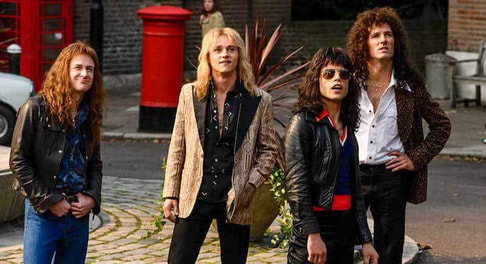C+ | Freddie Mercury's life while he was fortunate enough to be associated with the great men of Queen Directed by Bryan Singer Starring Rami Malek, Lucy Boynton, and Gwilym Lee Review by Jon Kissel |

That May et al occupy as much time as they do is a mistake, but the film does understand that Mercury should get the lion’s share of the focus. This is good and right, but how the film treats his attraction to other men is something out of a Pureflix production. The cinematic language, especially coming from gay director Bryan Singer, is laughably retrograde. His girlfriend and confidant Mary Austin (Lucy Boynton) is given soft camera light that illuminates her blonde hair like a halo, while every gay assignation is implied to take place in a truck stop bathroom or with a nefarious leather daddy, in shadows and accompanied by a dark change in the score. This is the equivalent of Steven Spielberg making a movie about Jews who run the world from a shady backroom, but then the credibly-accused rapist Singer may very well have some kind of internalized shame that he’s splashing all over Bohemian Rhapsody. That this subtext gets anywhere a film about a gay, or perhaps bisexual, icon is shameful, and veers into the kind of AIDS victim-blaming that froze government efforts to fund treatment research and resulted in the prolonging of a public health crisis that killed millions.
Even when Bohemian Rhapsody tries to communicate Mercury’s Dark Fucking Period (thank you, Walk Hard) in a less-loaded fashion i.e. drugs and partying, it fails here, too. Mercury throws a big party at one point, inviting a bunch of interesting-looking people to his home, including his useless bandmates who also happen to be world-famous rock stars at this point. Instead of having a good time in what looks tame by rock star standards, they criticize Freddy and skulk out, as this isn’t their scene. If relaxing with a beer and meeting new people isn’t their scene, then they are the single least interesting musicians ever put to screen. As Freddy continues to decompensate, Bohemain Rhapsody again cribs directly from Walk Hard and includes a hastily-edited press conference meant to convey confusion and frustration but can only be funny thanks to how many times the exact same scene has been done before.
All the film’s cleverness seems to be exhausted in the barely-clever move of casting Mike Myers as a skeptical record executive. No doubt, the idea was to create a fun in-joke by having the man responsible for Bohemian Rhapsody’s (the song) cultural resurgence go on about how no one’s going to appreciate a nonsense rock opera. Setting aside the low-hanging fruit of this kind of terrible writing, in which a straw man is erected and set alight by hindsight, Myers’ inclusion is one more damning nail in the coffin. He preaches the safety of meeting audience expectations to Queen, but they want to make what inspires them, a sentiment contained within a film that strictly adheres to formula and meets audience expectations by hitting every milestone it can and putting Mercury into a tidy and tragic little box. A film this uninspired doesn’t even have the foresight to listen to what its own invented characters are saying.
We eventually return to the beginning of the film, as Mercury, having received his diagnosis and ahistorically told his bandmates about it, struts out onto the Live Aid stage for what will be acclaimed as the greatest live performance ever. A cultural moment as dramatic as this shouldn’t need juicing, but the writers frame it as a reunion (it wasn’t) and as past the point of Mercury’s prime (also false). This manufactured tension falls flat, and frankly, so does the scene itself thanks to all the unnecessary bits stuffed around the edges. In the film’s telling, Live Aid was in danger of failing, but Queen’s performance was so electric that it single-handedly fed thousands of starving African orphans. Where is this bar that the scene keeps cutting to, and why is it more compelling than a stadium of delirious fans? Why wouldn’t the camera stay on stage for the band’s apotheosis into rock godhood? How does a film mess up such a homer of a scene?
In the center of this shit whirlwind, Malek is physically credible as Mercury, though the film does him a disservice by showing footage of the real Mercury performing over the credits. Mercury’s mouth looks nowhere near as protruding as Malek’s giant dental appliance, a piece of unnecessary costuming if ever there was one. Everyone knows Malek isn’t actually Freddie Mercury, so why force him into an uncomfortable physical box if it’s going to make his performance worse? Outside of the physical, Malek has no chemistry with the band or with Boynton or with his eventual boyfriend, though I’d shift that more to functional dialogue than Malek himself. He and the soundtrack make Bohemian Rhapsody tolerable, because not even filmmakers as inept as these can completely neuter Queen’s arena rock anthems. What they can do is make one of the worst Best Picture nominees ever, but who cares when the career of credibly accused rapist Singer has been completely unperturbed by those allegations or his firing offenses on the set here, or when the movie grosses hundreds of millions worldwide and somehow receives the industry’s highest acclaim? In the film’s own telling, critics are useless nothings that will one day be splashed onscreen as historically out-of-step contrarians. If Bohemian Rhapsody the film ever gets the kind of reconsideration that Bohemian Rhapsody the song got, I’ll step into an ominously lit men’s room and get what I’ve apparently got coming to me. D
 RSS Feed
RSS Feed